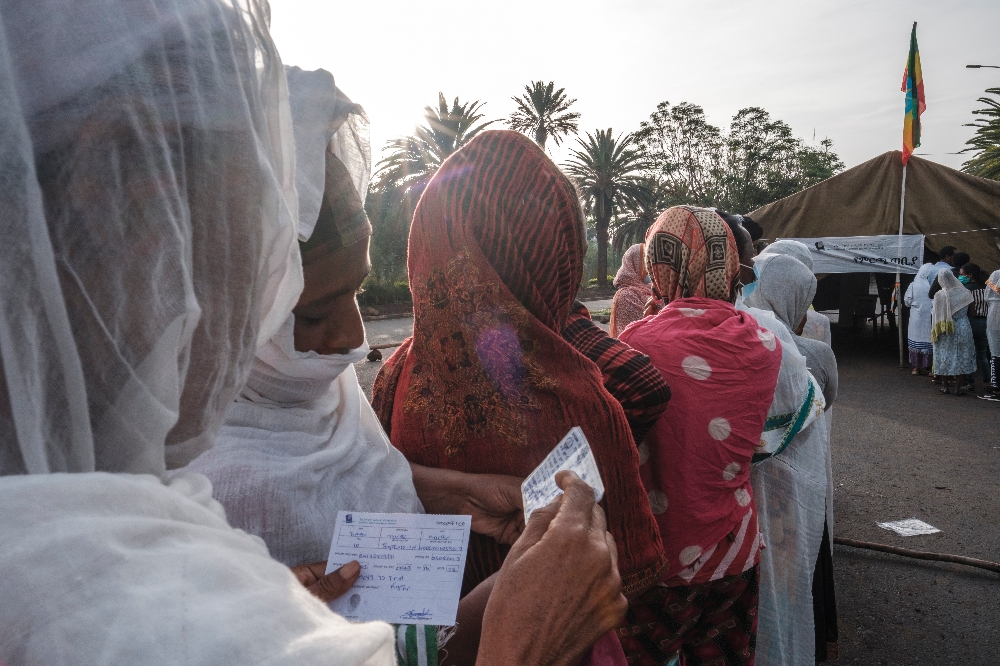PICTURE: AFP
Ethiopians voted on Monday in a delayed national election taking place against the backdrop of war and famine in the northern Tigray region and questions over the poll’s credibility.
Prime Minister Abiy Ahmed, 44, is facing voters for the first time since coming to power in 2018 championing a democratic revival in Africa’s second-most populous country, and a break from its authoritarian past.
“This election is different,” said Milyon Gebregziabher, a 45-year-old travel agent voting in the capital Addis Ababa. “There are a number of parties to choose from. In the past there was just one, we did not have the luxury of choice.”
Abiy, a Nobel Peace laureate who freed political prisoners, welcomed back exiles and ended a cold war with neighbouring Eritrea before sending troops to confront the dissident leadership of Tigray late last year, has promised this election will be Ethiopia’s most competitive in history, free of the repression that marred previous ballots.
Find out more on the activities of the @_AfricanUnion Election Observation Mission #AUEOM, headed by H.E. Chief Olusegun Obasanjo, at the 21 June 2021 General Elections in the Federal Democratic Republic of #Ethiopia @ https://t.co/l5OYFOMnBQ pic.twitter.com/CaXu18kyuq
— African Union (@_AfricanUnion) June 21, 2021
But the spectre of famine caused by the ongoing fighting in Tigray, and the failure to stage elections on schedule in one-fifth of constituencies, cast that promise into doubt.
Dawn queues
Voters wrapped in blankets against the pre-dawn chill and wearing face masks queued up to vote, while electoral officials in purple vests sprayed their hands with sanitiser before checking their IDs against the register.
“I believe this election will shine a light of democracy on Ethiopia,” said Yordanos Berhanu, a 26-year-old accountant at the head of a queue of hundreds.
“As a young Ethiopian, I (have) hope for the future of my country, and believe voting is part of that,” she said.
In Bahir Dar, capital of the northwestern Amhara region which neighbours Tigray, voters said peace and economic growth were the priorities.
“No matter who wins, we want peace,” said 25-year-old job seeker Mirkuz Gashaw.
#EthiopiaElections At one of the polling stations in #Adama ?
? Mati Olana (BBC) pic.twitter.com/lEezfhKGHu— Beka Atoma Boru (@bek_boru) June 21, 2021
“As a citizen, I hope our country prospers and grows,” said first-time voter Etsubdink Sisay, 18, waiting in line with her mother.
Once votes are counted, national MPs will elect the prime minister, who is head of government, as well as the president – a largely ceremonial role.
President Sahle-Work Zewde told AFP she was impressed by the turnout and believed the vote would “bring all Ethiopians together” despite their challenges.
“This is very good for the stability of Ethiopia, for the future of Ethiopia,” the president said after planting a tree in a school courtyard to commemorate election day.
Abiy’s ruling Prosperity Party is the firm favourite to win a majority and form the next government, tasked with bringing peace to Tigray and rebuilding an economy hammered by the coronavirus pandemic.
6th national elections in Ethiopia. #EthiopiaDecides2021 pic.twitter.com/oGmW6Qmiw6
— Coletta Wanjohi (@WanjohiColetta) June 21, 2021
At a polling station in Addis Ababa, opposition leader and former political prisoner Berhanu Nega of the Ethiopian Citizens for Social Justice Party was cautiously optimistic that the vote would be democratic as billed.
“I hope this will not be an election of the past, this will be an election that will determine the future,” he said.
The election was twice delayed – once because of the pandemic, and again to allow more time to organise the ballot across a huge nation.
At least 38 million Ethiopians are registered to choose among more than 40 parties and 9 500 candidates, but polls are not going ahead in one-fifth of the country’s 547 constituencies, with some areas deemed too insecure – plagued by armed insurgencies and ethnic violence – while in others logistical setbacks made arranging a vote in time impossible.
A second batch of voting is to take place on September 6 to accommodate many of the districts not taking part Monday.
Shadow of war
But there is no election date set for Tigray, where UN agencies say 350,000 people face famine conditions, a depiction the government disputes.
Tigray has 38 seats in national parliament, but residents in the capital Mekelle were more concerned with finding fuel and other basic supplies Monday than with polls outside the region.
In November, Abiy sent troops into Tigray promising a swift campaign to oust its ruling party but seven months later the conflict drags on.
On Monday, UN rights chief Michelle Bachelet said she was “deeply disturbed” by continued accounts of atrocities in Tigray, including extrajudicial killings and sexual violence.
The conflict has damaged Abiy’s standing as a peacemaker and is overshadowing a vote that is meant to broadcast his country’s democratic intent.
“Unlike some negative narratives that you can hear from the rest of the world… this shows how people are eager for elections. Ethiopia is getting stronger,” Dina Mufti, the foreign affairs spokesperson and a ruling party candidate, told AFP.
In a handful of places where the vote is going ahead Monday, opposition parties are boycotting in protest, including the populous and influential Oromia region, from where Abiy hails.
Vote counting is due to start soon after polls close, but results are not expected for several days.
Source: AFP


